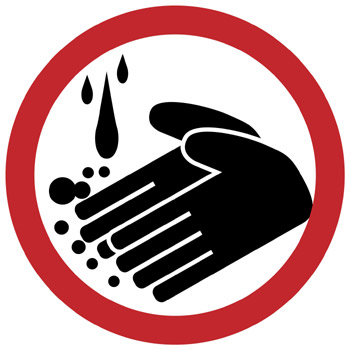A day in the life of an evironmental health officer

With thousands of people employed within the Irish food sector, Environmental Health Officer Lisa Fitzpatrick explains why hygiene is imperative to its success
15 December 2010
 A number of food outlets in a Dublin-based shopping centre were forced to close this year as a result of a cockroach infestation. A large burger restaurant also had to temporarily shut its doors due to a burst sewage pipe in the food storage area, while a dirty café was told to close up shop due to mouse droppings, which were littered across the premise.
A number of food outlets in a Dublin-based shopping centre were forced to close this year as a result of a cockroach infestation. A large burger restaurant also had to temporarily shut its doors due to a burst sewage pipe in the food storage area, while a dirty café was told to close up shop due to mouse droppings, which were littered across the premise.
In fact, a total of 44 premises have been served Closure Notices so far this year because of significant breaches in food legislation, including dirty premises, unhygienic practices and improper storage. If this were Hell’s Kitchen, Gordon Ramsey would have run out of obscenities!
Public health imperative
Ensuring that a premise that deals with foodstuff is hygienic is imperative to the health and safety of the general public, and employees; as is making sure certain food is stored and cooked properly and that staff are well trained.
Overseeing that such standards are being enforced and adhered to, so that nobody ends up with a bellyache, or worse a severe bout of food poisoning, is the Environmental Health Officers Association (EHOA) – a group of individuals responsible for safeguarding our health in general.
The EHOA was set up in 1949 to promote, educate and advise on environmental and public health issues. A concern for the organisation in 1950s Ireland was the spittoon in public houses, a large pot used to collect the nicotine-stained spit of tobacco chewers, who would regularly clear their throats of phlegm throughout an evening.
The EHOA was responsible for urging a ban on the unhygienic spittoon – and to this day it is an active force, offering training courses, information and guidance to its members and the general public.
 Enforcing food safety legislation
Enforcing food safety legislation
In specific regard to food, 1999 was a milestone year for the organisation, when the Food Safety Authority of Ireland (FSAI) passed an Act, which allowed for the enforcement of food legislation. This particular Act handed power over to environmental health officers to dole out improvement notices and orders on sub-standard establishments – and ultimately close a premise that isn’t up to scratch.
Often mistakenly referred to as ‘Health Inspectors’, the correct title in Ireland for a person whose job it is to police the sanitation of the food sector, is an Environmental Health Officer (EHO).
If a film were to be made about EHOs, no doubt Hollywood directors would portray them as lone bounty hunters – out to get the bad-guys, no matter what. But Liza Fitzpatrick, PRO and practicing EHO, reassures me that she doesn’t roll into establishments waving a pistol and taking no prisoners!
“As with any enforcement role there can be differences of opinion from time to time, but on the whole we encounter very few problems in the course of our work,” says Lisa.
“As a profession we have a reputation for being reasonable in our approach to enforcement and where possible we work with the food and service industry towards improving standards rather than immediately throwing the book at someone.”
An EHO’s work is never done
Despite progressing leaps and bounds in the past 60 years, in terms of enforcing food safety legislation and educating those working in the sector, it appears that an EHO’s work is never quite done.
The 44 businesses that have so far been forced to close this year, due to significant breaches in food legislation, represent an increase of 10 closures in comparison to 2008. FSAI chief executive Dr Alan Reilly says the figures are disappointing.
“The same recurring, but easily preventable faults continue to contribute to the closure of food businesses and this must be addressed by food business operators.”
Very poor hygiene in an establishment; inadequate pest control or pest infestation; lack of adequate cooking or refrigeration equipment; inadequate or no food safety management system; and inadequately trained staff are the main reasons food businesses are closed under food legislation, according to the FSAI. Another reason is plain old bad luck, claims Lisa.
“The large burger restaurant we had to close this year was due to a burst sewage pipe in the food storage area. This issue was no fault of the food business, but it needed to close while the situation was rectified and the risk of contamination of food removed,” says Lisa.
“We are the eyes and ears of the public behind the scenes and we have a statutory duty to act in their best interests.
“We all know that the food industry is one of the most important industries within the Irish economy. Thousands of people are employed in it. We want it to stay like that,” she adds.
Looking for the highest standards
When inspecting a premise Lisa says she is looking out for any sign of “a grave or immediate danger to public health”. Her visits are unannounced and for the purpose of ensuring that all food consumed, produced, marketed and distributed in Ireland meets the highest standards of food safety and hygiene.
While food-production factories, restaurants and take-away outlets are all on Lisa’s radar, so too are convenience stores and petrol stations that sell hot food or have a small café attached.
In general Lisa says that these premises boast a high standard when it comes to safe food practices, but she does highlight where risks can arise:
“These types of businesses in general can be small in size so this limits the type of product and volume of food that can be prepared and served safely. Carrying out too many activities or too much volume without the sufficient space can be hazardous,” says Lisa.
“There must be sufficient space for all food handling activities, refrigeration, equipment, storage, and waste management, staff changing and sanitary facilities,” she adds.
C-stores or petrol stations also often use ready-to-eat foodstuffs, such as sandwich fillings, and these are high-risk products, warns Lisa.
“The danger associated with these ready-to-eat foods is that the consumer will not be applying any further processing – like cooking – to the product.
“If the consumer eats this product and there are harmful bacteria on it, then this bacteria ends-up in the consumer’s stomach. For that reason the preparation, handling and storage of these products must not be a source of contamination,” she says.
In general, hands are highly responsible for the spread of germs, stresses Lisa, and while gloves can reduce the risk, they are only effective when used in association with an adequate hand-washing regime, before and after preparing food.
Fears of businesses skimping on safety
Being vigilant about cleanliness and safe-food practices is the only way to ensure that no nasty food-poisoning cases break out, but with the current economic crisis looming at every corner, Lisa fears that some businesses might skimp on safety.
“Training is a legal requirement for all staff working in a food environment. Like every sector of the economy the food industry is facing a recession and businesses are trying to make savings, but it is imperative that these cuts do not affect training and impinge on food safety, and in turn public health,” says Lisa.
With many immigrants coming to Ireland to work over the past years, perhaps opening up ethnic restaurants or small cafes, Lisa says the last decade has proved a learning curve for both the operators and the regulators. New operators to the country have had to learn about the law and standards expected in Ireland, and even about the role of the EHO. But in order to help foreigners succeed in business here, the EHOA now supply all their information in Polish and Chinese, if required.
Practice what you preach
So, at the end of a long day, when Lisa has completed her checks, advised her clients and ensured that good hygiene practices are top of the agenda, does she go home and start all over again? Is she fanatical about cleanliness in her own home?
“Anyone who knows me knows I’m a real foodie. My favourite pasttime is eating out in restaurants,” she says.
I am no “Monica”, so I concentrate on the important basics like temperature control, keeping raw and cooked food separate and avoiding cross contamination through regular hand-washing and clean dishcloths when it comes to my house. The same hazards occur in a domestic kitchen as within a food business operation, so the same rules apply.”
Lost your thirst?
Shocking levels of contamination in bottled waters sold in Ireland were recently exposed in a report by the State’s food safety watchdog. The report found that one-in-every-11 samples of Irish-produced water tested positive for harmful bacteria – compared to just one in every 119 imported brand samples tested. Contamination discovered in bottled water has included faeces, as well as traces of arsenic and lead.
Maintenance of the cold chain is vital
A study published by the Food Safety Authority of Ireland (FSAI) earlier this year to assess the microbiological safety of pre-packaged sandwiches shows that 99% were satisfactory when tested for the food borne bacteria Listeria monocytogenes and coagulase positive staphylococci. However, of concern was the fact that 29% of sandwiches tested were stored or displayed at temperatures higher than 5°C. The study found that some sandwiches, which were classified as unsatisfactory or unacceptable/potentially hazardous, had been stored above 8°C, with one sandwich displayed unrefrigerated at 17.9°C.



 Print
Print






Fans 0
Followers